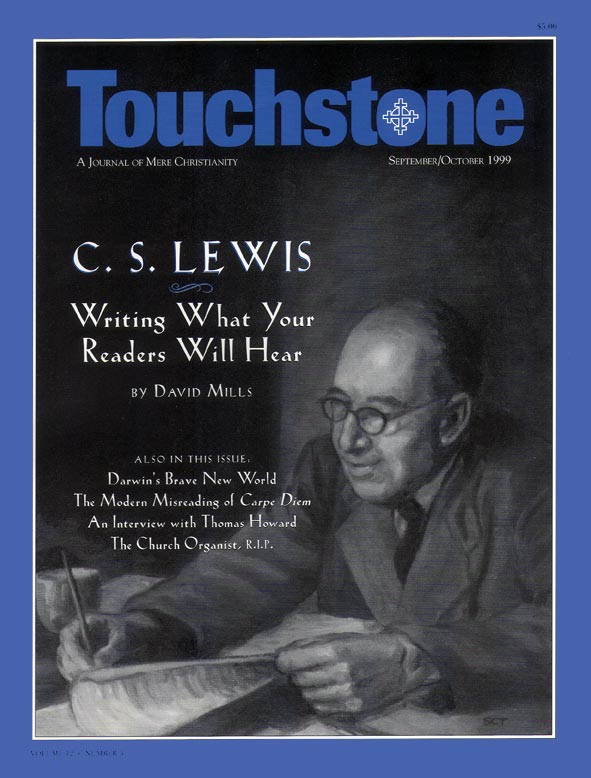Losing Our Illusions
Whatever their political persuasions in general, or their personal assessments of Mr. Clinton in particular, most Americans are clearly agreed that the President’s high approval ratings among the populace last winter went a long way toward explaining the Senate’s reluctance to convict him of the offenses for which he was impeached. For some well-known conservative Christians—Cal Thomas, for instance—that decision of the Senate, and more especially the popular sentiment prompting it, became the occasion for a deep reassessment of their own commitment to political activism.
Indeed, such a reassessment should be taken as a challenge to the rest of us. At a distance of some months now, and especially on the eve of an election year, it seems appropriate for conservative Christians to analyze more deeply certain moral dimensions of practical politics in this country. For a long time, after all, much of the political activism of Christian conservatives, especially at the national level, was based on certain premises that now appear highly doubtful. For example, there was an operative premise claiming that there exists in this country a dependable “moral majority” of ordinary citizens demanding probity of their leaders and expecting the policies of their government both to be inspired by moral principles and to be guided by their conscientious application. That is to say, it was assumed that, if we only organized the moral conservatives, we would have a majority.
Now, however, such an assessment hardly seems realistic. The notion that the majority of American citizens are principled and morally serious, expecting the same principles and a like moral seriousness in their political leaders, was utterly destroyed this past year by the many polls revealing them to be nearly the opposite. If those polls were accurate, as the Senate obviously believed them to be, a grievous inattention to principle and a severe dearth of seriousness chiefly characterize the moral climate of this land. Indeed, if those polls demonstrated any trait dominant in our citizenry, it was a clear preference for individual freedom and economic prosperity over ethical principle and cultivated virtue. While one can easily find, nowadays, more than sixscore thousand persons that cannot discern between their right hand and their left hand, and also much cattle, it is less obvious that a majority is any longer constituted by there being still seven thousand in Israel, all the knees that have not bowed unto Baal, and every mouth which hath not kissed him.
This melancholy appraisal, nevertheless, hardly justifies a general retreat of Christians from the public square, nor, as far as I know, have any responsible believers drawn such an inference. On the contrary, our evangelical obligation to leaven the social lump is in no way diminished by the increasing magnitude of the task, nor does the growing darkness lessen our duty to hold high the discernible light delivered to our stewardship.
That said, one may suggest three further biblical truths of which the political events of this past year may serve to remind us:
First, the pursuit of wealth is never without risk, and the danger grows as that pursuit itself casts off godly and humane restraints. Whereas limitless economic growth is an idolatrous ideal that Christians should employ every effort to repudiate, it is a rare thing to hear conservative Christians do so nowadays. To the contrary, for too long a goodly number have fashioned dubious political alliances with those elements in political life devoted only to individual freedoms and the limitless pursuit of material prosperity, forgetting the deep gulf that divides those who deny that “man lives by bread alone” from those who assume that he does.
If conservative Christians would actually sit down and study the atheistic economics of such darlings of the political Right as Ludwig von Mises in the light of what they already know from their reading of, say, the prophet Amos, they would quickly discern how little they have in common with the former. (Maybe they will want to do what I did several years ago: spend Lent reading the whole of Human Action to its last disgusting and indigestible page; it was a penance more severe than flagellation.)
Second, war is a very evil thing that God hates, and constant preparations for war will eat away at a nation’s moral heart. This must especially be the case when such preparations include weapons designed to destroy civilian populations. If conservative Christians in the public forum have been excessively disposed to align themselves with purely wealth-driven forces, some of them have likewise failed to put sufficient distance between themselves and those who favor our nation’s growing indulgence in geopolitical military adventures. Simply put, politically conservative Christian voices in this country have been too muted with respect to world peace and the danger of trying to solve each international problem by recourse to armed force. Christians will, on the contrary, instinctively abhor violence and go to sacrificial lengths to prevent it, knowing that if God resists the purely wealth-driven, he reserves a yet more special wrath for the warmonger.
Finally, minds and hearts are converted one by one. In recent years a number of conservative Christian activists have succumbed, in some measure, to the modern urge to replace repentance by program. That is to say, they have channeled their necessarily limited resources toward gaining political results instead of gaining souls for Christ by the spiritual transformation of minds and hearts. One is not here describing an entirely either-or thing, of course, but it is a plain fact that certain sorts of activity require curtailing other sorts; I cannot run and swim simultaneously.
This does not mean, I think, that Christians are to abandon all attempts to influence governmental policy, or to wait until we can fight all our battles from a position of political strength. For instance, no matter how politically feeble our voice or apparently futile our efforts right now, we should not cease to plead for the inalienable rights of the unborn child, nor to lessen our vigilance against pornography or the legal recognition of homosexual alliances as an alternative form of marriage. Such battles must be fought simply as matters of principle, no matter what our political strength. Similarly, to the extent that we are able, it seems to me appropriate for conservative Christians to join others in striving for such political advantages as tax laws that are more family-friendly and school voucher programs that would encourage the growth and increase the availability of church-based education for our children.
At the same time, those in stewardship over Christian resources must make decisions with respect to the disposition of those resources, and such decisions may eliminate or delay the attainment of some of our political goals. Not everything can be done at once, and certain hopes may have to be postponed. For example, strenuously have some conservative Christian activists labored and lobbied for the restoration of school prayer, exhausting time and other resources that might have been better spent actually teaching Christians to pray. One must consider that, if this were a Christian country, there would be no controversy about school prayer. We must not deceive ourselves; one does not significantly alter the room temperature by holding a small flame under the thermostat. All he does thereby is give the situation a false reading. If prayer were brought back into our school systems this very day, how far would this go toward making this a Christian country?
Patrick Henry Reardon is pastor emeritus of All Saints Antiochian Orthodox Church in Chicago, Illinois, and the author of numerous books, including, most recently, Out of Step with God: Orthodox Christian Reflections on the Book of Numbers (Ancient Faith Publishing, 2019).
subscription options
Order
Print/Online Subscription

Get six issues (one year) of Touchstone PLUS full online access including pdf downloads for only $39.95. That's only $3.34 per month!
Order
Online Only
Subscription

Get a one-year full-access subscription to the Touchstone online archives for only $19.95. That's only $1.66 per month!
bulk subscriptions
Order Touchstone subscriptions in bulk and save $10 per sub! Each subscription includes 6 issues of Touchstone plus full online access to touchstonemag.com—including archives, videos, and pdf downloads of recent issues for only $29.95 each! Great for churches or study groups.
Transactions will be processed on a secure server.
more from the online archives
calling all readers
Please Donate
"There are magazines worth reading but few worth saving . . . Touchstone is just such a magazine."
—Alice von Hildebrand
"Here we do not concede one square millimeter of territory to falsehood, folly, contemporary sentimentality, or fashion. We speak the truth, and let God be our judge. . . . Touchstone is the one committedly Christian conservative journal."
—Anthony Esolen, Touchstone senior editor










